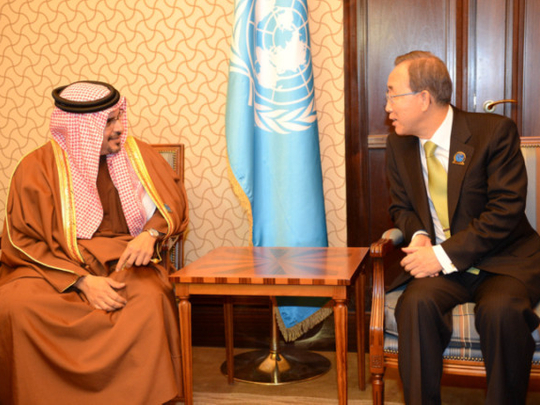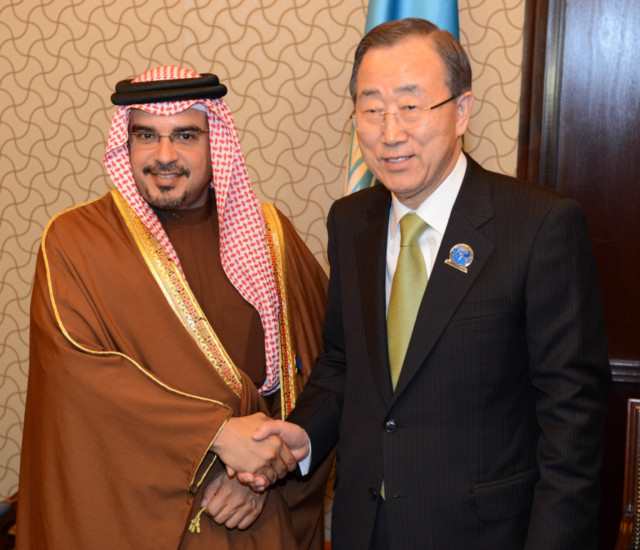
Manama: Bahrain remains committed to a proposed national dialogue as a “serious step forward,” Crown Prince Salman Bin Hamad Al Khalifa has said.
The comprehensive approach to the dialogue is premised on the fact that all sides are aware of their responsibility towards the stability of the country and the sustainability of its achievements with a focus on the higher national interests as the ultimate goal that requires rational ideas and the shunning of violence, he said, Bahrain News Agency (BNA) reported.
According to the crown prince who was meeting UN Secretary General Ban Ki-moon at the donor conference for Syrian refugees, the report issued by the Bahrain Independent Commission of Inquiry (BICI), an international fact-finding panel, was a standard adopted by Bahrain to move forward in achieving further progress in several areas and recover, in cooperation with the competent international organisations, from the challenges related to past events.
The BICI, made up of five international experts, was set up in June, 2011, by King Hamad Bin Eisa Al Khalifa to look into the events that unfolded in February and March that year and their consequences.
Following four months of field work and thousands of interviews, the commission issued a searing report that included a narrative of what happened and a series of recommendations.
King Hamad accepted the report and called for the prompt and full implementation of the recommendations.
In Manama, reports on Thursday said that the number of the participants in the expected national dialogue in Bahrain could rise to 24.
Initial claims referred to 20 participants, 12 from registered political societies and eight independent personalities.
However, there is now talk in the Bahraini capital about boosting the number of society representatives to 16, eight from each of the two alliances expected to sit at the discussion table.
In a move aimed at strengthening their stances at the expected dialogue, ten other political societies formed the National Alliance and said that they would give the names of their representatives over the weekend following a series of consultations.
At the other side of the political spectrum, six opposition societies formed an alliance and said that they welcomed the dialogue.
However, in their letter to the justice minister, they referred to it as “negotiations” and not “dialogue.”
The societies offered their views on the dialogue and insisted on the participation of the government as interlocutors and not as coordinators.
The official spokesperson for the government last week said that it would oversee the dialogue, but not be part of it.
The opposition also called for adopting the dialogue outcome as constitutional formulas and not recommendations and wanted the participants to go beyond the political discussions to include other matters.
The justice ministry last week announced that it started contacting the political formations in the country to nominate their representatives at the talks that will address political issues.
However, more than one week after the ministry’s request, the societies have not forwarded the names amid a flurry of consultations to set terms and reach pre-dialogue agreements.
The government has been saying that the dialogue would be a new round of talks that would continue the earlier rounds held in July, 2011, and that addressed the economic, social and human rights issues.
Around 300 people took part in the talks and endorsed a set of recommendations that included amending the constitution to empower the elected lower chamber over the appointed upper chamber, a key demand by the opposition.
The constitutional recommendations were implemented last year.
However, the move towards holding a new dialogue that will help heal the deep social, political and economic scars that marked relations between the various communities within Bahrain for almost two years has been challenged by radicals.
In December, Crown Prince Salman who had pushed without success for talks amid all parties four days into the February, 2011, unrest, stressed that dialogue between all sides in Bahrain was the only way forward.
“I believe that dialogue is the only way forward,” he said. “Geopolitically, demographically and historically, the differing political views represented in disparate political groups here in Bahrain must be reconciled. They will only be reconciled by sitting together and agreeing a framework where the limit of what is acceptable is the limit of what is unacceptable to the other, with the ultimate goal being to reach an agreement,” Prince Salman said as he opened the Manama Dialogue, an international security conference held in Bahrain annually.
He insisted on the importance of all sides holding a meeting to address divergences.
“I am not a prince of Sunni Bahrain; I am not a prince of Shiite Bahrain. I am a prince of the kingdom of Bahrain and all mean a great deal to me personally,” he said.













